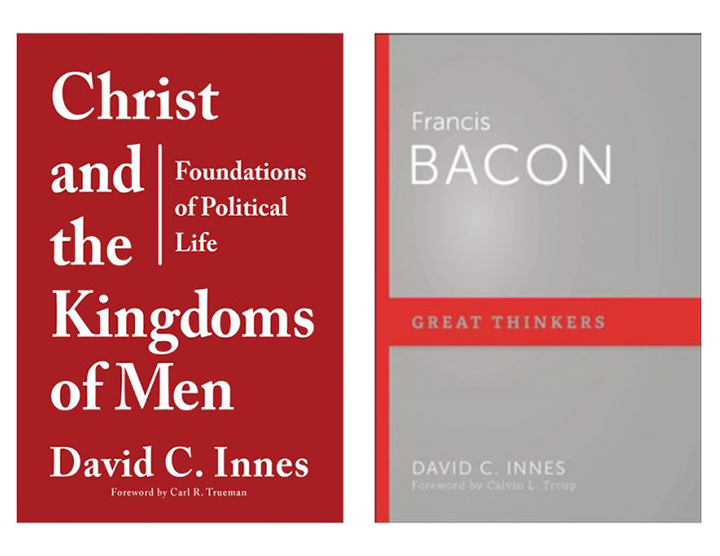Dr. David Innes Publishes Two Books: ‘Christ and The Kingdoms of Men’ and ‘Francis Bacon’
'Christ and The Kingdoms of Men' and 'Francis Bacon' both tackle the problems of "how to preserve the good in modernity and overcome its evils," Innes says.

Dr. David Innes, chairman of the program in Politics, Philosophy, and Economics and professor of politics at The King’s College, recently published two books: Christ and The Kingdoms of Men and Francis Bacon (both published by P&R Publishing in 2019). According to Innes, both books are about modernity. In Innes’s words, both tackle the problems of “how to live wisely in the modern world, how to confront the problem of modernity—if there is a problem—and how to preserve the good in modernity and overcome its evils, if that is possible.”
Christ and The Kingdoms of Men
At the end of the Introduction to Christ and The Kingdoms of Men, Innes states that the purpose of his book is to “help make sense of political life and to equip [the 21st century Christian] for love of civic neighbor, whether as citizen or as statesman.” In Innes’s account, the years after World War II brought an embrace of the modern political and philosophical project, at the expense of the classical and Christian roots of American political life. Like a three-legged stool, our political project rests on principles from the classical, Christian, and modern traditions, and our common life flounders with only one leg left standing. Modern life, Innes claims, is more “fragmented, self-absorbed, and self-defeating, albeit ever more secure, comfortable, and delightfully entertaining.”
This book does not, however, strive to endorse a rejection of liberalism. It instead endorses a reassessment of Enlightenment thought and a reaffirmation of the classical and Christian basis for our politics. Innes notes that the deterioration of institutions of family and church have pushed people to turn to “old nationalisms, old hatreds, and ever newer vices in search of identity and community.” The remedy to these issues lies in our return to a Christian understanding of our common life, “one that accords with God’s revelation of who he is, who we are, and our chief end.”
Francis Bacon
Innes writes in the Introduction, “Why should a thoughtful, modern reader care about Francis Bacon (1561-1626)? The most pressing reason is that we live in Bacon’s world. He planned it all and we participate unwittingly in his grand project.” Innes’s Francis Bacon offers a study of what makes the world—and what makes us—modern. Understanding Bacon, he says, is “an exercise in autobiographical reflection, and intellectual and spiritual self-assessment.”
Much of Bacon’s legacy lies in his insight into the role science now plays in the modern world. “Bacon is arguably the father of modern science,” Innes contends. Today, science “touches everything, shapes everything, tells everything what it is and what it may aspire to become.” Bacon’s project has been realized and accepted in the last four centuries. Science is no longer a part of life, but the whole of life, as Bacon claimed it would be. Bacon bequeathed us “scientism,” the belief that studying natural science—having facts, data, measurable and quantifiable observations—is the only way to truly know anything. The modern world has “embraced religiously” scientism, exactly as Bacon predicted. Bacon’s plan was to reform mankind’s thinking about everything so that we might conquer nature to relieve our miserable earthly condition.
According to Innes, Bacon’s view for a future world has been a “tremendous mercy.” The progress which has been accomplished by science, medicine, and technology are the fruits of Bacon’s insights. Innes’s book allows readers to appreciate the modern benefits of Bacon’s world, but also draws our attention to the dark side of this promise—a dark side of which Bacon was fully aware. (C.S. Lewis illuminates this dark side in his book The Abolition of Man: “Man’s power over Nature turns out to be a power exercised by some men over other men with Nature as its instrument.”)
The King’s College held a book launch and Q&A with Innes on November 22. Christ and The Kingdoms of Men and Francis Bacon are available for purchase “wherever good books are sold,” Innes says.




